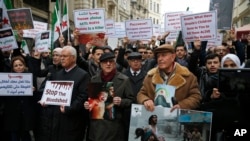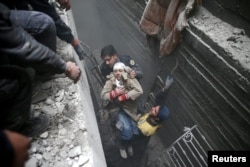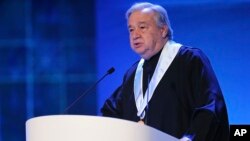The United Nations Security Council is scheduled to vote Friday at 11 a.m. in New York (1600 GMT) on a draft resolution intended to implement a 30-day pause in fighting across Syria and lift the siege on the town of eastern Ghouta to allow humanitarian aid and medical evacuations.
Russia expressed objections to the draft Thursday and proposed amendments to the resolution submitted by Sweden and Kuwait. It was not immediately clear how Russia, a staunch ally of the Syrian government, would vote.
Sweden’s ambassador said they would first review the amendments put forward by the Russians.
“We are trying to find a way forward that will work for everyone, but of course that has meaningful implications on the ground,” Olof Skoog told reporters.
On Thursday, the United States harshly criticized Russia and Iran over the bombing of eastern Ghouta.
U.S. State Department Spokeswoman Heather Nauert said at a news briefing that Russia has a “unique responsibility” for the more than 400 people “horrifically killed by the Syrian regime” in the Damascus suburb.
“Without Russia backing Syria, the devastation and the deaths would certainly not be occurring,” Nauert said.
The resolution needs nine votes in favor and no vetoes by any of the five permanent members of the council: Russia, China, the United States, Britain or France.
Kelley Currie, deputy U.S. ambassador to the U.N., said that while Russia had asked for the meeting to find a way out of the situation, it appeared intent on “blocking any meaningful effort to do so.”
“The United States is ready to vote on this resolution right here and right now,” Currie said.
At the Security Council meeting the Russian ambassador dismissed as “not possible” the proposed cease-fire and accompanying aid deliveries, along with large-scale medical evacuations.
“Here what we need is not symbolism, not decisions for the sake of decisions, but measures undertaken commensurate with the realities on the ground,” Russian envoy Vassily Nebenzia told council members. “The Security Council needs to reach agreement on feasible — not populistic, severed from reality — decisions.”
Nebenzia criticized media coverage of the military operations on the besieged rebel enclave of eastern Ghouta, as a “massive psychosis” and said there is a campaign to tarnish Syria and Russia. As he has previously done, he accused the civil society first responders known as the White Helmets of being close to terrorist groups and acting as part of a “misinformation campaign.”
“There is an impression that all of eastern Ghouta is comprised of hospitals alone and that the Syrian army is fighting against those hospitals,” Nebenzia said. “This is a well-known tactic in information warfare.”
The U.S.-based medical relief organization the Syrian American Medical Society (SAMS) said Wednesday that 13 medical facilities had been targeted in a two-day period. Four were destroyed and two had to temporarily close.
U.N. humanitarian chief, Mark Lowcock, who briefed council members via video link from Geneva, urged support for the humanitarian pause.
“You are all as member states aware that your obligations under international humanitarian law are just that: binding obligations,” Lowcock said. “They are not favors to be traded in a game of death and destruction.”
He warned that counterterrorism efforts must not supersede the duty to protect civilians, and he noted that the U.N. Human Rights Office has documented at least 346 civilian deaths this month and some 900 injuries.
“The international community must take urgent and concrete action,” Lowcock said. “What we need is a sustained cessation of hostilities and we need it desperately.”
On Wednesday, U.N. Secretary-General Antonio Guterres appealed to the council to approve the cease-fire and especially to help the 400,000 besieged residents of eastern Ghouta, whom he said, “live in hell on Earth.”
Last year, the enclave was designated as one of four “de-escalation zones” in a deal with Syrian President Bashar al-Assad’s supporters, Russia and Iran, along with Turkey.
But fighting has escalated as the Syrian military and its allied forces appear to be launching an all-out operation to retake eastern Ghouta, which is one of the last areas near Damascus still under control of the armed opposition.














